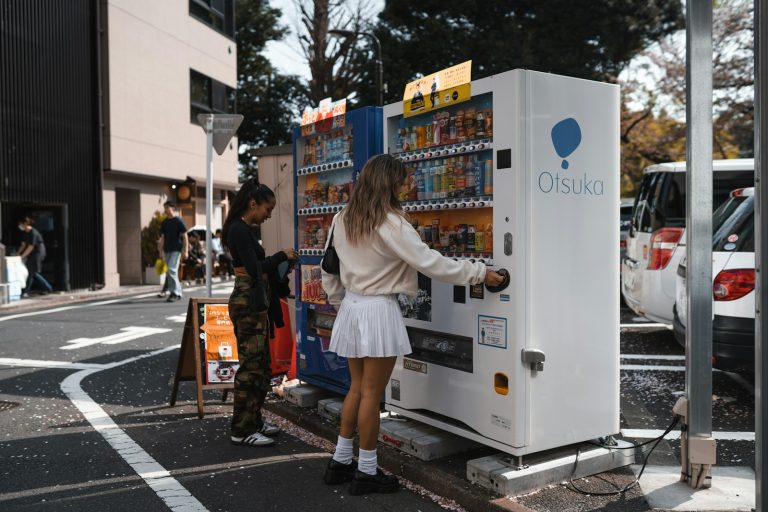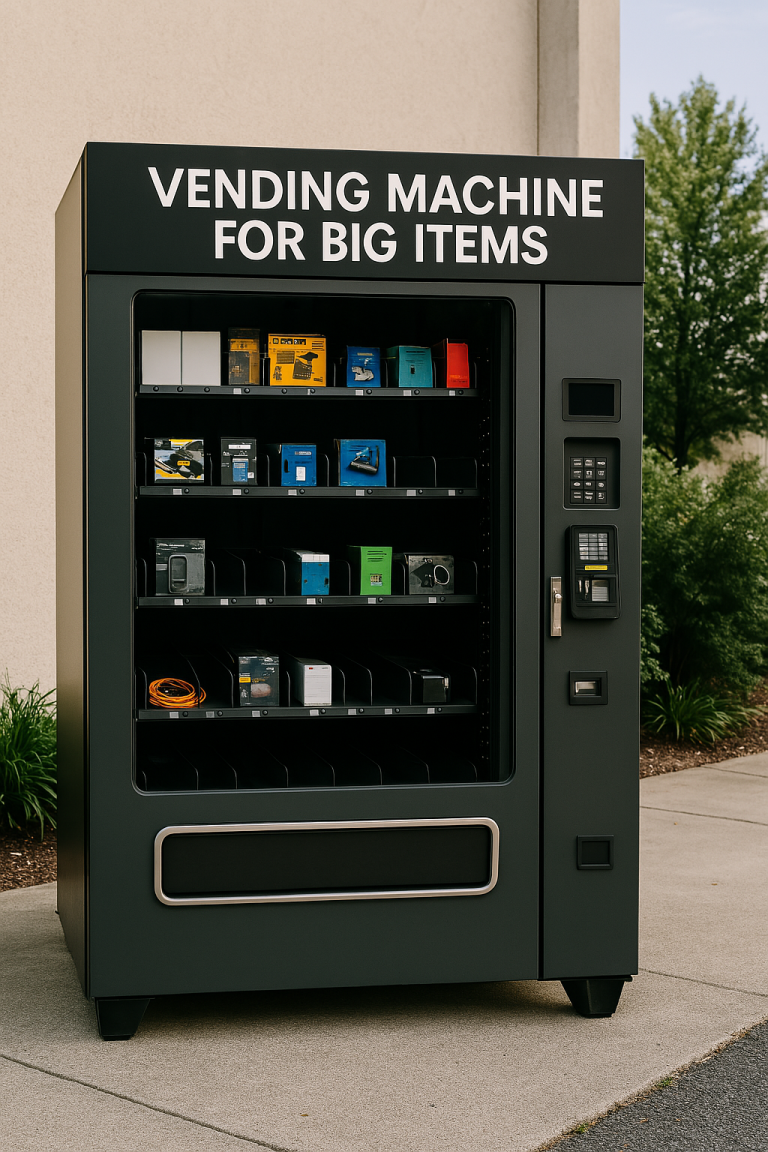Our vending machines are built to order with a 45-60 day lead time. Flexible Financing Options available starting at less than $100/mo. Apply for Financing
How to Finance a Vending Machine: A Comprehensive Guide

Financing a vending machine business is a crucial step for aspiring entrepreneurs looking to enter this lucrative market. Whether you are purchasing your first vending machine or expanding your fleet, understanding your financing options can help you make informed decisions. This article will delve into the various methods available to finance a vending machine, the types of loans you can consider, and essential tips for navigating the financing process.
Understanding Your Financing Needs
Before exploring financing options for your vending machine business, it’s essential to conduct a thorough evaluation of your specific needs and requirements. This preparatory step can significantly influence your financial decisions and overall business success. Here are some critical factors to consider:
- Initial Costs of Vending Machines:
- Types of Machines: Basic snack and drink machines typically range from $1,500 to $3,000. Specialized machines, such as those that accept credit cards or have advanced features, can cost upwards of $5,000 or more.
- Additional Costs: Beyond the purchase price, account for inventory costs (initial stock), transportation fees, location fees, and maintenance expenses.
- Revenue Projections:
- Analyze potential locations and expected sales. For instance, a well-placed vending machine can generate $100 to $500 per month, depending on foot traffic and product selection. Understanding your revenue potential helps determine how much financing you will need.
- Ongoing Operational Costs:
- Maintenance and Repairs: Machines may require regular servicing, which can incur costs over time. Understand whether your financing option will cover maintenance or if you’ll need to budget for it separately.
- Restocking Supplies: Factor in how often you’ll need to restock your machines and the associated costs. The frequency of restocking can depend on location demand and the type of products offered.
Financing Options for Vending Machines
Once you have a clear understanding of your needs, it’s time to explore the various financing options available to help you effectively finance your vending machine business. Selecting the right financing option is crucial as it can significantly impact your cash flow and overall business success. Here are some common methods to consider:
1. Personal Savings
Utilizing personal savings is often the most straightforward approach. If you have sufficient savings, this option allows you to avoid debt and interest payments. However, it can be risky if your business does not generate profits quickly.
- Pros:
- No debt incurred.
- Full ownership of the machine.
- Simplified financial management.
- Cons:
- Depleting personal savings can impact your financial security.
- Potential for financial strain if the business fails to perform as expected.
2. Business Loans
Business loans are a common way to finance vending machines. Here are some types of loans to consider:
- Traditional Bank Loans:
- Banks offer competitive interest rates for established businesses. However, they often require a solid credit history and a detailed business plan.
- Advantages: Lower interest rates and longer repayment terms.
- Disadvantages: Rigorous application process and collateral may be required.
- Small Business Administration (SBA) Loans:
- The SBA provides loans specifically for small businesses with favorable terms, such as lower interest rates and longer repayment periods. These loans can be used for purchasing vending machines and covering other startup costs.
- Advantages: Government backing reduces lender risk.
- Disadvantages: Lengthy approval process and stringent eligibility requirements.
- Microloans:
- For those needing smaller amounts, microloans are available from various non-profit organizations and lenders. They can be ideal for new entrepreneurs looking to get started without significant upfront costs.
- Advantages: Easier approval than traditional loans.
- Disadvantages: Limited loan amounts (usually under $50,000).
3. Vending Machine Loans
Vending machine loans are tailored specifically for operators in this industry. They can help you purchase or lease machines and often have terms that cater to your specific business needs.
- Types of Vending Machine Loans:
- Secured Loans: These loans require collateral (often the vending machine itself) and may offer lower interest rates.
- Unsecured Loans: These loans do not require collateral but usually come with higher interest rates.
- Advantages:
- Quick approval processes.
- Flexible repayment terms.
- Some lenders may not require extensive credit checks.
- Considerations: Research lenders who specialize in vending machine financing to find competitive rates and favorable terms.
4. Equipment Financing
Equipment financing allows you to borrow money specifically for purchasing equipment, including vending machines. The machine itself often serves as collateral for the loan.
- Pros:
- Lower interest rates compared to unsecured loans.
- Keeps cash flow available for operating expenses.
- Flexible terms based on the equipment’s lifespan.
- Cons:
- If you default on payments, the lender can repossess the machine.
- Limited to financing only the equipment, excluding operational costs.
5. Leasing Options
Leasing is an alternative to purchasing vending machines outright. Instead of paying the full price, you make monthly payments to use the machine for a specified period.
- Advantages of Leasing:
- Lower upfront costs make it accessible for startups.
- Opportunity to upgrade machines at the end of the lease term.
- Maintenance and support are often included in the lease agreement.
- Disadvantages:
- You do not own the machine, and you may have to return it at the end of the lease.
- Long-term costs may exceed purchasing outright if the lease extends over several years.
Tips for Securing Vending Machine Financing
- Prepare Your Business Plan:
- Lenders want to see a well-thought-out business plan that includes your vending machine operations, target market, projected revenue, and expenses. Include detailed financial projections to demonstrate your business’s potential profitability.
- Check Your Credit Score:
- A good credit score can significantly impact your loan terms. Check your credit report and take steps to improve it if necessary. Address any inaccuracies and pay down debts to increase your score.
- Research Lenders:
- Look for lenders that specialize in financing vending machines. Compare rates, terms, and customer reviews to find a reputable lender that meets your needs.
- Gather Required Documentation:
- Be prepared to provide documentation, including financial statements, tax returns, and business licenses when applying for loans. The more organized you are, the smoother the application process will be.
- Consider Alternative Financing:
- Explore crowdfunding platforms or peer-to-peer lending as alternative financing options. These can provide capital without the stringent requirements of traditional loans, especially if you have a compelling business idea.
Conclusion
Financing a vending machine involves understanding your needs and exploring various funding options to ensure you can start and grow your business successfully. By carefully evaluating your financial situation and considering all available options—whether through personal savings, business loans, or specialized vending machine financing—you can make informed decisions that will set your vending machine business on the path to success. With the right financing strategy, you can turn your entrepreneurial dream into a profitable reality.



